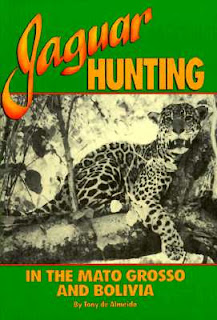I just finished reading what may be the best book on large and dangerous game hunting that I ever read, “Jaguar Hunting in the Mato Grosso and Bolivia”, by Brazilian professional hunter Tony de Almeida.
The book is primarily dedicated to the hunting and natural history of the “jewel of the South American jungles”, Panthera onca, known in Brazil as Onça Pintada and in the rest of the world as Jaguar, but also has chapters about water buffalo hunting in the Marajó Island as well as Marsh Deer (Cervo do Pantanal) and many other animals.
Tony describes in details the difficult and challenging pursuit for the world’s third largest cat and the exciting and many times dangerous moments when the onça finally was bayed by the rounds and when the hunters had to come within feet of the rather displeased and aggressive animal. Clearly an adventure not for the faint of heart.
When you read this book you will feel like you are sitting around a camp fire in the Pantanal do Mato Grosso recovering from and arduous day trailing dogs through swamps and jungles, and Tony is calmly recounting one of many stories of previous hunting under the Southern Cross, and that a dominant male onça may call at any time.
However, in spite of the great hunting stories, one of the most significant parts of the book is chapter XI “The Role of the Hunter” and his description of how he managed his “hunting concessions” from the 1960’s to the late 1980’s without any decline in the onça population, reinforcing the point that wildlife, when properly managed, is a renewable natural resource than can be enjoyed generation after generation.
In this chapter when discussing substantial reduction or even extinction of wildlife, he comments that “The prohibition of sport hunting…, incidentally, has been brought about mostly by the pressure of armchair naturalists from around the world, who by meddling in a field where they possessed no practical knowledge, have defeated their own interests.”
Brazil is one of the largest countries in the world and one of the very few where almost all hunting is outlawed and not properly regulated. Recently the IBAMA (Brazilian federal environmental authority) even prohibit control hunting of invasive species such as the European boar (Sus scrofa) that are moving up north from Argentina and Uruguay, even after a wild boar killed a farmer in Minas Gerais state. The justification behind this move was that they received a letter from an unnamed non-governmental organization saying that they were “displeased” with hunting for these harmless pigs!
In other parts of the book Tony comments on that scrounge of jungles, wildlife’s worst enemy anywhere and at anytime, the poacher. Poachers destroy wildlife for profit and are generally supported by profiteers with political connections. As my friend and South African professional hunter Frans Busiahn once told me, they are the lowest life form in earth, even lower than a child’s molester.
Tony describes how the onça population increased in a certain area after they killed a very large and old dominant male. Apparently more young males could survive or enter the region after that and better serve the many females, contributing with their genes and helping increase the species population.
This correlated with a conversation that I had with a game warden in North Dakota when I was hunting pheasants in 2009. Dan, the warden explain that following a season with lower hunting pressure or when less roosters are taken (pheasant hens cannot be shot in most of the United States), the survival rate of young birds in the spring is greatly reduced as the older aggressive roosters kill many young pheasants to prevent future competition. Would pheasants and jaguars have similar personalities?
“The encouragement of a proper hunting spirit, a proper live of sport, instead of being incompatible with a love of nature and wild things, offers the best guarantee of their preservation.”
Theodore Roosevelt


The legal hunting in Brazil is banned, but the killing of jaguars is very large by the farmer who have attacked his cattle.It is easier to say No to open hunting than Yes. The Yes ever demand other attitudes that the government doesn´t want to do.
ReplyDeleteEloir Mário form Brazil